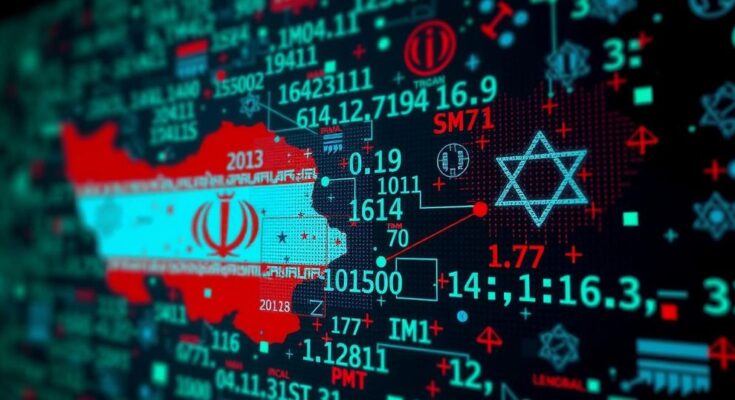Since the commencement of the Gaza war, Iranian cyberattacks against Israeli targets have surged, now comprising nearly half of all Iranian operations. Microsoft reports that prior to the conflict, Iran primarily targeted the U.S. This increase includes significant social media influence efforts aimed at destabilizing Israel. Casualties from the conflict are considerable on both sides, with implications for global political support dynamics.
A recent report from Microsoft indicates that since the onset of the Gaza war last year, Iranian cyberattacks directed at Israel have intensified remarkably, positioning Israel as the primary target of Iranian cyber operations. The report highlights that prior to the war, Iran primarily focused its cyber activities on the United States. According to the Microsoft Digital Defense Report, from October 7, 2023, to July 2024, nearly 50% of the observed Iranian cyber operations were aimed at Israeli companies. This is a stark increase compared to the period from July to October 2023, when only 10% of Iranian cyberattacks were directed at Israel. During that same timeframe, 35% targeted American entities, and 20% were aimed at the United Arab Emirates. Tehran has also ramped up its social media campaigns in a bid to destabilize the Israeli state. Microsoft reported that within two days following the attack by Hamas, Iranian operatives initiated several new influence operations. For instance, an account named “Tears of War” was established to impersonate Israeli activists critical of Prime Minister Benjamin Netanyahu’s crisis management concerning hostages taken by Hamas. Additionally, another account, named “KarMa,” was reportedly created by an Iranian intelligence unit and falsely presented itself as a group of Israelis demanding Netanyahu’s resignation. Following the war’s commencement, Iranian entities expanded their operations to include impersonation of partner organizations. Notably, an Iranian service created a Telegram account that utilized the logo of Hamas’s military wing to disseminate false information regarding hostages in Gaza while issuing threats against Israelis. The investigation did not determine whether these actions were carried out with Hamas’s knowledge or consent. Furthermore, Iranian groups have extended their cyber-enabled influence operations beyond Israel, focusing on undermining international political, military, and economic support for Israel’s military endeavors. The violence that ensued following the Hamas attack on October 7, 2023, has resulted in significant casualties, with Israeli authorities reporting the deaths of 1,206 individuals, predominantly civilians. In retaliation, Israel’s military campaign in Gaza has reportedly caused the deaths of 42,289 individuals, most of whom are civilians, according to figures released by the health ministry in Gaza, information that the United Nations has indicated is reliable.
The escalation of Iranian cyberattacks against Israel is set against the backdrop of the prolonged tension and conflict marked by the recent Gaza war. Prior to the conflict, Iran concentrated its cyber operations on American targets, but the Israel-Hamas war has prompted a strategic shift, diverting its focus to Israel. This shift can be attributed to the ongoing hostilities and the geopolitical ramifications of the conflict. Cyber warfare serves not only as a means of direct attack but also as a tool for influencing public perception and political landscapes, making it an integral part of modern warfare.
In summary, the Microsoft report reveals a notable shift in Iranian cyber operations from focusing on the United States to predominantly targeting Israel since the escalation of the Gaza war. The introduction of parallel influence campaigns on social media illustrates the multidimensional approach Iran is taking to destabilize Israel amid the ongoing conflict. The high rate of casualties attributed to both the Hamas attacks and the subsequent Israeli military actions underscores the severity of the situation and the potential implications of cyber warfare in shaping international responses and support regarding the conflict.
Original Source: www.voanews.com



